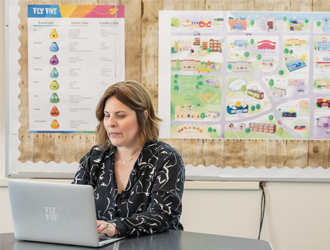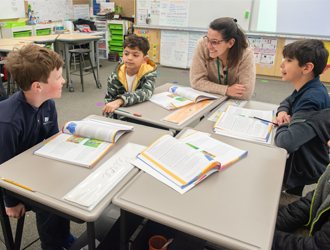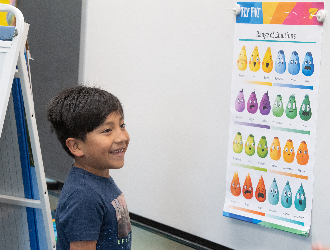Cooperation at Home

During the pandemic, cooperation is of paramount importance. As students are learning from home, parents are working from home, and families are in constant close proximity, being able to work well with others and resolve differences quickly can spell the difference between calm and chaos. While we are facing great challenges, some universal and many that are more personal, we can find opportunities to strengthen our family bonds and grow together through cooperation.
In order to foster cooperation, especially in times when the landscape of our lives has shifted and stress and anxiety may be high, we have to focus on what we have in common and ensure that everyone’s needs are being met (Suttie, 2020). As a family, what values, hopes, and needs do you share? How can everyone work together to ensure that all family members are heard, validated, and supported? Although our routines have changed, we can take steps to ensure that our families are building healthy, happy relationships and supporting each other in pursuit of a bright future.

Below, we outline productive strategies for nurturing cooperative behaviors in your family:
• Open a dialogue. All members of a family need an avenue to say how they are feeling, and they must be listened to with respect and understanding. Consider setting a regular meeting time each week to discuss concerns, house rules, and what’s going well. Focus on using respectful language and establishing clear, specific rules and boundaries to adhere to as a family (NYU Langone, 2020). Validate all concerns, even if they may seem small. Does your child miss wearing their favorite shoes to school? Tell them you understand, be sure they feel heard and understood, and discuss some at-home options that may fill that void. Also, take the lead on highlighting what’s going well, for individuals and the whole family, so everyone knows they’re all in this together!
• Establish a structure. While it may be difficult to adhere to a structured day when everyone is at home, structure is important for students and adults alike. Work together to put small routines in place that everyone can (mostly) stick to: have a morning family meeting to set the purpose for the day, set a schedule for screen time or for certain work spaces in the home, or plan to have one family game night per week (NYU Langone, 2020).
• Share responsibility. Research suggests that cooperative parenting with shared responsibility promotes prosocial behavior and a sense of family security (Scrimgeour et al., 2013). While more of the family may be spending more time together these days, find opportunities for everyone in the home to do their part. Sharing responsibility among parents models cooperation for children, and encouraging children to take on different roles in the house is an excellent opportunity for them to practice many SEL skills. If there are siblings, consider giving them bigger projects, like organizing a bedroom or closet, where they can work together to complete the task.
• Look for root causes of conflicts or behavioral problems. Children are feeling the effects of the pandemic as well, and stress will affect each child differently (Evolve, n.d.). If siblings are fighting more than usual, consider what their underlying needs might be. Does the older sibling maybe need more space or alone time, while the younger is seeking connection? Perhaps a child is being less independent than usual because they are feeling stressed or lonely. Once you get to the root cause, you can work together to alleviate it. The same goes for parents! If you’re feeling fatigued or frustrated, reflect on what may be causing it. Do you need emotional support, a shoulder to lean on, or some extra alone time? Model how to ask for what you need respectfully, and allow children to do the same.
• Have fun together! Most importantly, prioritize having fun as a family. This can look like setting family goals that require cooperation, like completing a puzzle or making a family mural. Plan a weekly movie night, with each family member choosing the film and another choosing the snacks. Or try to learn a new skill together, like origami or painting. Let children open the discussions and give them the opportunity to plan the activities, which is a fun way for them to practice cooperation in an interactive, practical way.
As the contours of our lives continue to be redrawn and the lines between school, work, and home remain blurred, it’s inevitable that we’re going to feel some level of tension or frustration. But we are in control of how we respond to challenges, and this response informs how children react, as well. By taking small steps to foster cooperation, kindness, and respect in our homes, we can ensure that our families not only survive but continue to thrive, even in the face of these challenging times.








